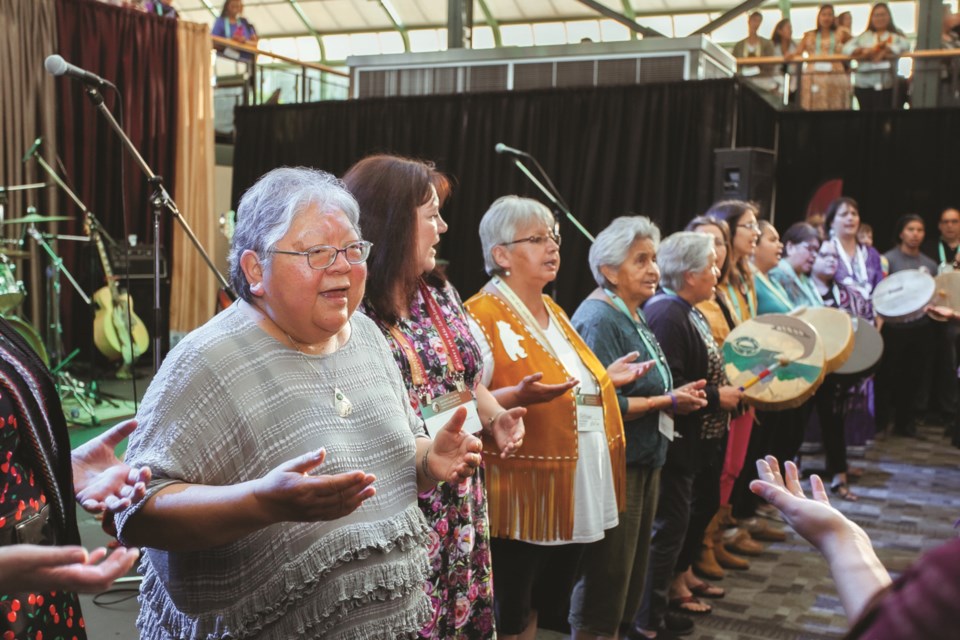Lil’wat linguist and educator Dr. Wanost’sa7 Lorna Williams was recently taking part in a conference at Queens University entitled “Stabilizing Indigenous Languages.” In fact, Williams not only spoke at the event, she served as its inaugural “Conference Grandmother,” which seems a fitting role for a woman who has made it her life’s mission to pass on her acutely honed sense of identity and culture to new generations of Indigenous learners.
Now the University of Victoria professor will have the chance to expand on that vital work after she was named as one of four Pierre Elliott Trudeau Foundation fellows for 2021. The fellowship means Williams will help scholars enrolled in the foundation’s three-year leadership program “expand their horizons and support them in developing a unique engagement with issues and ideas that are outside their doctoral training,” the foundation said in a statement announcing this year’s fellows. The scientific theme for this three-year cycle is Language, Culture and Identity.
“I was happy to be able to participate because of the topic; it’s on language and culture, and then to be able to work with up-and-coming scholars, it’s a good time for me to be able to do that,” Williams told Pique.
An Order of Canada recipient and the first director of UVIC’s Indigenous education program, Williams’ has played a crucial role in the revitalization and preservation of the Lil’wat culture and language, Ucwalmícwts, and helped establish Mount Currie’s band-run school in 1973, then only the second school in Canada of its kind.
“Wanost’sa7’s vast knowledge and expertise will be invaluable to a program focused on language, culture and identity,” said Kúkwpi7 Skalúlmecw Chief Dean Nelson in a release. “Her work has been essential to revitalizing Indigenous language and culture.”
Williams career has taken her all over the world, and the fellowship will include teaching in New Brunswick as well as South Africa, which counts at least 35 Indigenous languages, 10 of which are officially recognized.
“I do quite a lot of work in many parts of the world, and I see the challenges that are faced by Indigenous languages because Indigenous languages have pretty much been treated the same way everywhere,” Williams noted.
No matter where she is, Williams leans on the Lil’wat ways of teaching to help others identify similar lessons in their own language and culture. Williams still remembers a time not long ago when Mount Currie was viewed by outsiders as “kind of a backwards community because we held onto our culture,” she said, both due to its geography, meaning the community was relatively closed off from the urban sprawl of the Lower Mainland, and the painstaking lengths generation after generation of Lil’wat went to in order to maintain their ways of life.
“I had the privilege of being immersed in my culture, so I use it as an example to help people look at their own. For example, at UVIC, I developed a course called ‘Learning and Teaching in an Indigenous World,’ and I used the concepts of teaching and learning from Lil’wat,” she explained. “It was to encourage people in other languages to look inside their own language for those concepts. It’s really been an anchor for me, so I share it in that way.”
More than just preserving a language, Williams helps students develop a deeper sense of identity and connection to their heritage, work that comes with added significance after the recent reminders of the ways in which this country has sought to brutally and systematically shear Indigenous people from their culture and communities through the residential school and reserve systems.
“The work that we’ve been doing in Mount Currie and the work that we’ve been doing through the First Peoples’ Cultural Council, for example, has been to work with who we call silent speakers,” she said. “Now there are people … who know the language, who spoke the language as young children, but they stopped speaking it because of their experience not just at residential schools … but through [public] schools. There was pretty harsh treatment in the grade schools as well. It just silenced them. They stopped speaking, even though they know the language.
“People don’t realize the harshness and the negativity that came with the silencing of the language, so we’ve had to develop and find different ways of being able to do that kind of work. B.C. is pretty much a leader around the world in doing this kind of work.”
To learn more, visit trudeaufoundation.ca/updates/news/pierre-elliott-trudeau-foundation-welcomes-2021-fellows.




